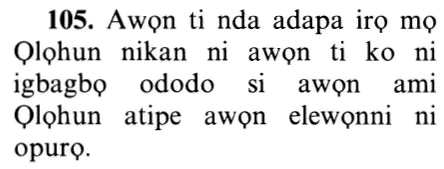16vs105
Select any filter and click on Go! to see results
Yoruba Translation

Hausa Translation
Abin sani kawai waɗanda bã su yin ĩmãni da ãyõyin Allah, sũ ne suke ƙirƙira ƙarya. Kuma waɗannan sũ ne maƙaryata.
Asbabu n-Nuzuul (Occasions of Revelation)
إِنَّمَا يَفْتَرِي الْكَذِبَ الَّذِينَ لاَ يُؤْمِنُونَ بِآيَاتِ اللّهِ وَأُوْلـئِكَ هُمُ الْكَاذِبُونَ ﴿١٠٥﴾
It is only those who do not believe in Allah's Ayat who fabricate the falsehood, and it is they who are liars.
Then Allah informs that His Messenger is not a forger nor a liar, because the one who fabricates falsehood about Allah and His Messenger is the most evil of creatures.
...الَّذِينَ لاَ يُؤْمِنُونَ بِآيَاتِ اللّهِ ...
Verily, those who do not believe in Allah's Ayat,
Allah will not guide them, and theirs will be a painful punishment, meaning, the disbelievers and heretics who are known to the people as liars.
The Messenger Muhammad, on the other hand, was the most honest and righteous of people, the most perfect in knowledge, deeds, faith and conviction. He was known among his people for his truthfulness and no one among them had any doubts about that - to such an extent that they always addressed him as Al-Amin (the Trustworthy) Muhammad.
Thus when Heraclius, the king of the Romans, asked Abu Sufyan about the attributes of the Messenger of Allah, one of the things he said to him was, "Did you ever accuse him of lying before he made his claim?''
Abu Sufyan said, "No''.
Heraclius said,
"He would refrain from lying about people and then go and fabricate lies about Allah.''
ثم أخبر تعالى أن رسوله صلى الله عليه وسلم ليس بمفتر ولا كذاب لأنه إنما يفتري الكذب على الله وعلى رسوله صلى الله عليه وسلم شرار الخلق " الذين لا يؤمنون بآيات الله " من الكفرة والملحدين المعروفين بالكذب عند الناس والرسول محمد صلى الله عليه وسلم كان أصدق الناس وأبرهم وأكملهم علما وعملا وإيمانا وإيقانا معروفا بالصدق في قومه لا يشك في ذلك أحد منهم بحيث لا يدعى بينهم إلا بالأمين محمد ولهذا لما سأل هرقل ملك الروم أبا سفيان عن تلك المسائل التي سألها من صفة رسول الله صلى الله عليه وسلم كان فيما قال له : هل كنتم تتهمونه بالكذب قبل أن يقول ما قال ؟ قال لا فقال هرقل : فهل كان ليدع الكذب على الناس ويذهب فيكذب على الله عز وجل .
"إنما يفتري الكذب الذين لا يؤمنون بآيات الله" القرآن بقولهم هذا من قول البشر "وأولئك هم الكاذبون" والتأكيد بالتكرار وإن وغيرهما رد لقولهم "إنما أنت مفتر"
هذا جواب وصفهم النبي صلى الله عليه وسلم بالافتراء .
I'raab - grammatical analysis of the Qur'an
«إِنَّما» كافة ومكفوفة.
«يَفْتَرِي» مضارع مرفوع بالضمة المقدرة على الياء للثقل والجملة مستأنفة.
«الْكَذِبَ» مفعول به.
«الَّذِينَ» اسم موصول فاعل.
«لا يُؤْمِنُونَ» لا نافية ومضارع مرفوع بثبوت النون والواو فاعل والجملة صلة.
«بِآياتِ» متعلقان بيؤمنون.
«اللَّهِ» لفظ جلالة مضاف إليه.
«وَأُولئِكَ» الواو استئنافية وأولاء اسم إشارة في محل رفع مبتدأ.
«هُمُ» ضمير فصل لا محل له.
«الْكاذِبُونَ» خبر مرفوع بالواو لأنه جمع مذكر سالم والجملة مستأنفة.
